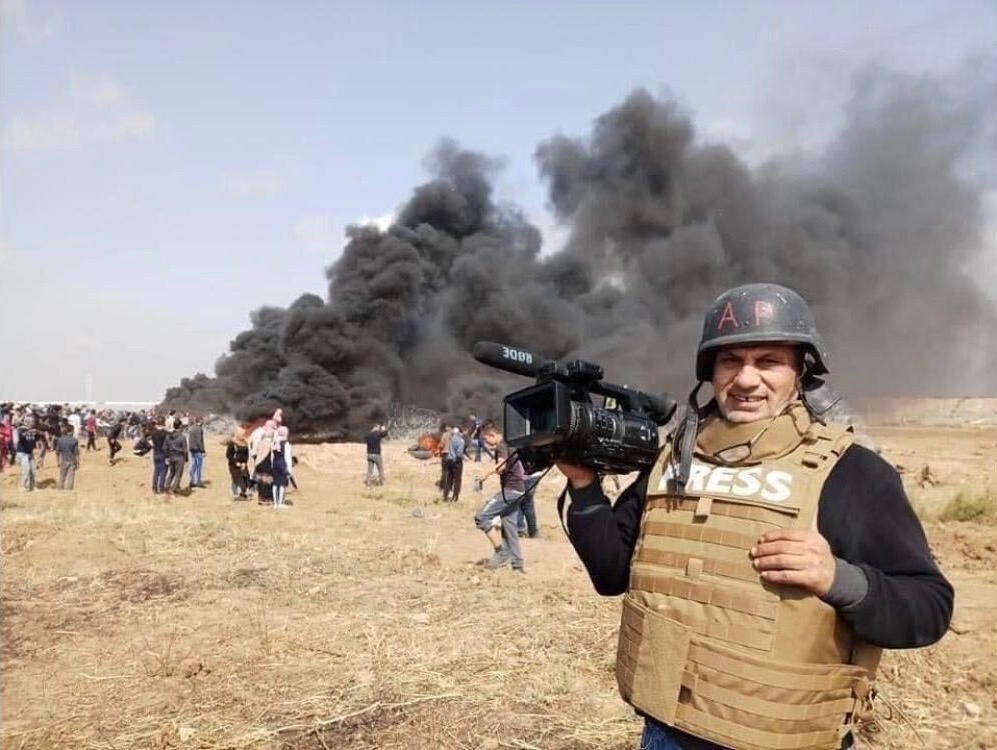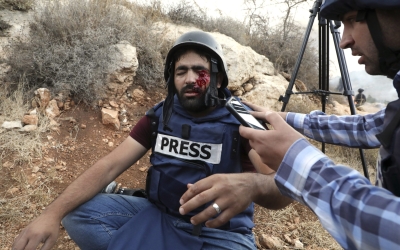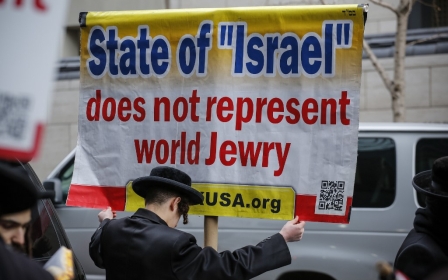Palestinian journalist says Associated Press fired him over row with PA

Palestinian journalists are standing together in solidarity after one of their colleagues, Eyad Hamad, a veteran cameraman for the Associated Press (AP), was fired from his post.
Hamad, 63, told journalists and activists on Wednesday night that he had received a call from the AP office in Jerusalem letting him know that he was being terminated.

New MEE newsletter: Jerusalem Dispatch
Sign up to get the latest insights and analysis on Israel-Palestine, alongside Turkey Unpacked and other MEE newsletters
Hamad, a resident of the occupied West Bank city of Bethlehem, claimed that he was fired after Palestinian Authority (PA) officials filed a complaint against him to his superiors at AP over a personal conflict between him and Palestinian police spokesperson Luay Zreiqat, among other issues.
Zreiqat allegedly threatened Hamad numerous times in recent weeks after the journalist kicked him out of a Whatsapp group for local journalists.
The conflict appears to have been exacerbated when Hamad openly criticised the PA for the arrest last week of Anas Hawari, a reporter for the Hamas-affiliated Quds News Network.
During a demonstration against Hawari’s arrest, Hamad stood alongside a number of his fellow journalists and held a sign that read: “President Mahmoud Abbas, I demand protection from the [Palestinian] security agencies.”
Sources close to the Palestinian police told Middle East Eye, however, that no complaints were in fact filed against Hamad to the AP, refuting the allegation that the PA was the cause of his termination.
Mohammad al-Lahham, head of the freedoms committee at the Palestine Journalists Syndicate (PJS), also said that PA officials have widely denied any involvement in AP’s firing of Hamad.
While he didn’t rule out the possibility of PA involvement, Lahham, a close friend of Hamad’s, suggested that his termination could have had to do with a number of warnings issued to the journalist by AP over his involvement in solidarity protests in Palestine.
“Back when journalist Muath Amarneh was shot in the eye, Eyad was one of the journalists who stood in solidarity with [him] and protested the treatment of Palestinian journalists by the Israeli occupation,” Lahham said.
Lahham claimed that, at the time, the AP bureau in Jerusalem issued a warning to Hamad for participating in the protest and expressing his personal views on the matter.
“AP should recognise that when Palestinian journalists like Hamad stand in solidarity with one another against Israeli or Palestinian violations, we are not expressing our subjective opinions, we are standing up for our lives and for our rights as journalists,” Lahham told MEE.
AP refrained from commenting on the matter when contacted by MEE, but confirmed that Hamad is no longer an employee at the agency.
Dual threat
In the wake of Hamad’s termination, the veteran cameraman, who worked with AP for 20 years, has received an outpouring of support from fellow journalists and activists in the occupied territories.
George Canawati, head of Radio 2000 based in Bethlehem and a longtime colleague and friend of Hamad, told MEE that he was shocked and outraged when he heard the news of the termination.
“I was not only shocked that AP would fire someone who is such a pillar in the journalism world in Palestine, but more shocked to hear the Palestinian government may have had a hand in it,” Canawati said.
Canawati criticised the “dubious circumstances” under which Hamad was fired and called for AP to release an official statement providing a clear reasoning as to how they came to this decision.
'If we have to be worried about getting fired just for standing up for our rights and freedoms, how can we be expected to show the reality of what is happening on the ground here?'
- George Canawati, journalist
“Hamad has made strides for journalism in Palestine, and across the Middle East,” Canawati said. “What they did isn’t right.”
Lahham said that PJS has filed an official request to the Palestinian Ministry of Media and Information to launch an investigation into the incident, and to obtain an official letter from AP detailing why Hamad was terminated, and if there was in fact involvement from the government.
“Hamad is not only a great journalist, but he has always stood up for and defended the rights of his colleagues to speak freely without being targeted by any government, Palestinian or Israeli,” Lahham said. “He should not be penalized for this.”
Both Lahham and Canawati expressed fears that the firing of Hamad could have far-reaching consequences for journalists working in the occupied territories.
“Palestinian journalists are not operating in normal circumstances,” Canawait said.
“We are constantly under violent attacks from the Israeli occupation, and censorship and arrest from the Palestinian government.
“If we have to be worried about getting fired just for standing up for our rights and freedoms, how can we be expected to show the reality of what is happening on the ground here?”
Middle East Eye delivers independent and unrivalled coverage and analysis of the Middle East, North Africa and beyond. To learn more about republishing this content and the associated fees, please fill out this form. More about MEE can be found here.




